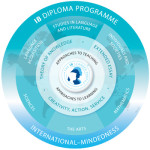 In addition to implementing the traditional curriculum, Bishop Noll is seeking the adoption of the International Baccalaureate curriculum, a highly rigorous program that is said to “develop the intellectual, personal, emotional and social skills to live, learn and work in a rapidly globalizing world”, according to the program’s website. In addition to the Advanced Placement and Advanced College Project classes that Bishop Noll already offers, the IB classes will hoist Noll’s academic status into the same realm as other highly competitive college preparatory schools.
In addition to implementing the traditional curriculum, Bishop Noll is seeking the adoption of the International Baccalaureate curriculum, a highly rigorous program that is said to “develop the intellectual, personal, emotional and social skills to live, learn and work in a rapidly globalizing world”, according to the program’s website. In addition to the Advanced Placement and Advanced College Project classes that Bishop Noll already offers, the IB classes will hoist Noll’s academic status into the same realm as other highly competitive college preparatory schools.
“My goal as principal is to have as many options possible for the different learners of this building,” said Mr. Craig Stafford, principal. “This goal is meant to serve every different type of learner at Bishop Noll.”
Set up much like a university degree program, the IB program requires students to choose one subject each from five different groups: studies in language and literature, individuals and societies, mathematics, sciences and language acquisition. Also, a sixth subject must be chosen from the arts category or from one of the previous five groups. Either three or four subjects must be taken at a higher level, while the remaining subjects can be taken at a standard level.
But the rigor doesn’t stop there. In addition to class time and course work during the two-year program, all IB students must complete a 4,000-word extended essay, take a “theory of knowledge” course (which is often compared to a college-level philosophy course), and be involved in creativity, action and service. The latter can be completed through Noll’s service work, athletics and fine arts opportunities.
Currently, the program exists all over the world, including 21 schools in Indiana. If Noll should adopt the program, it would make Noll the second Catholic high school in Indiana (besides Cathedral in Indianapolis) and the third high school in Northwest Indiana (besides Chesterton and Valparaiso) to offer this opportunity.
The adoption of the IB program in Chicago made headlines two years ago when Mayor Rahm Emanuel pushed several public schools to implement the program based on a University of Chicago study on CPS students which found that students in IB programs are 40-percent more likely to go to and stay in college than non-IB students. Another major advantage of the program deals with college preparedness. An IB student is forced to handle a heavy workload, as well as challenge their intellect.
But this advantage also works as a disadvantage. Many students, aged 14-18, do not have the self-discipline to handle the workload or the intensity of the material. However, the controversy is one that is still sought by many schools, like Bishop Noll, looking to challenge their student body.
Additionally, IB credits are recognized by colleges and universities all over the world, including Indiana University, Purdue University, Northwestern University, University of Chicago, University of Notre Dame, Ball State University, University of Illinois, Loyola University and hundreds of other premier institutions that many Noll students attend.
Unfortunately, Stafford says that this won’t be happening right away and might not be implemented for another two years.
“Bishop Noll has to be researched by the IB program in order to see if students at Noll are capable of handling a program so intense,” Stafford said.
